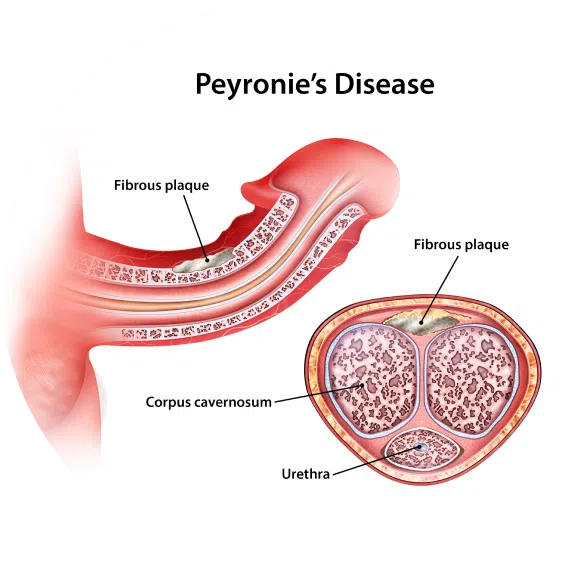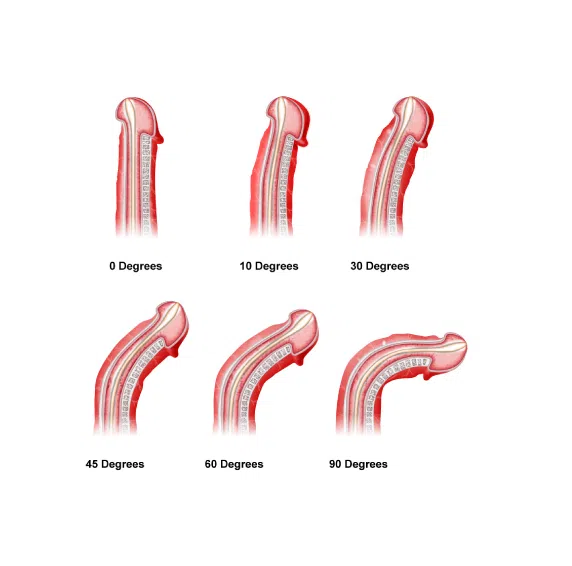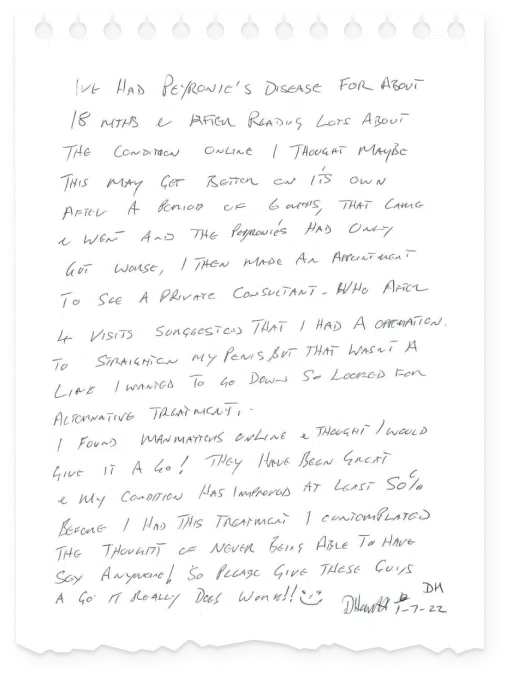Peyronie’s Disease Clinic
Explore the most advanced effective treatment options
at a reputable Peyronie’s Disease clinic in London.
- Natural, pain free results
- The only clinic in Europe that offers the combo of 5 most advanced non-surgical treatments
- 30 - 50 minutes treatments
- No downtime
- No side effects reported
- Firmer, stronger erections, for longer periods
- Affordable credit
- CQC registered clinic
As featured by:




Regain Your Sexual Health
Without Undergoing Surgery
Peyronie’s disease can be a distressing and complex condition, affecting both physical function and quality of life. If you’re experiencing symptoms such as penile curvature, pain, or plaque development, our specialist Peyronie’s disease clinic is here to help.
Operated by the team at MansMatters — one of Europe’s most respected and experienced clinics — we offer private, non-invasive care tailored to your needs. Our approach is focused, discreet and grounded in clinical expertise, helping men navigate Peyronie’s disease with clarity and confidence.
Whether you’re newly diagnosed, exploring your options, or looking for alternatives after previous treatments, we provide structured support at every stage. From in-depth assessment to personalised care planning, our team is committed to helping you take the next step forward.
Book your private consultation today and speak with a specialist at our Peyronie’s disease clinic.
Non-Surgical Treatment Options
Our clinic offers access to a range of non-surgical therapies that may form part of your personalised care plan. These treatments are designed to support tissue health, penile conditioning and symptom management without the need for surgery.
Non-surgical options available include:
Focused Shockwave Therapy
Extracorporeal Magnetic Transduction Therapy
The NanoVI
Exo
Medical
Vacuum
Pumps
The most appropriate combination will depend on your symptoms and clinical findings.
Explore our full treatment options.
All You Need to Know About Peyronie's Disease Before Seeking Treatment
Explained by Mr Leon Almashan
Learn about Peyronie’s Disease with Mr Leon Almashan in an exclusive interview at The Royal Society of Medicine. Discover everything you need to know about this condition, from its causes and symptoms to the available treatment options.

Listen to Mr Leon Almashan explaining all you need to know about Peyronie’s Disease in an interview at The Royal Society of Medicine.
Take the Peyronie's Disease Test
Answer a few simple questions. This test is for informational purposes only and not a substitute for professional medical advice.
"Over 6 weeks my erection has improved dramatically."
“After 8 years of being single after my wife passed, I entered into another relationship and was surprised to discover I had a Captain Hook like penis.
I can tell you over 6 weeks my erection has improved dramatically. My girlfriend is quite happy.
I’m really pleased with the whole process. Thank you.”
K.R.
"I'm a happy bunny having been thoroughly looked after by the people at MansMatters"
“The treatment I received from the professionals there has literally transformed my life, given me a new lease on life. My expectation has been transformed completely. My performance has changed from being barely acceptable to the point of inadequacy, yet it’s now turned around. As I say, life is much better, and I’m a happy bunny having been thoroughly looked after by the people at MansMatters.
R.H.
"The staff here have been brilliant, very welcoming and I'm really pleased overall"
“I’m here from Scotland and I’ve traveled down here for the last 10 weeks to get treatment for erectile dysfunction and a BPH (benign prostatic hyperplasia).
I can say that the treatment here has been very good, especially in terms of the erectile function, significant improvement there.
BPH not quite so much, but some improvement. I’m hopeful that will improve over the next few weeks, but the staff here have been brilliant, very welcoming and I’m really pleased overall.”
About Our Clinic
Peyronie’s disease can be a complex and frustrating condition, but you don’t have to face it alone. Our clinic is one of the only centres in the UK exclusively focused on the diagnosis and management of Peyronie’s disease.
Backed by a team with extensive experience in men’s sexual health, we offer a targeted, multi-disciplinary approach designed around your individual needs. From first enquiry to personalised care planning, everything we do is centred on providing clarity, reassurance and discreet support.
Why Choose a Specialist
Peyronie’s Disease Clinic?
Unlike general men’s health services, our clinic is specifically set up to support men with penile curvature and related symptoms. Clients choose us because we offer:
- Specialist care from professionals focused solely on Peyronie’s disease
- Access to multiple non-invasive therapeutic technologies
- Clear, structured pathways for assessment and support
- A discreet, private environment for consultation and care
UK-wide support with national access to our clinic team
Who We Help
Peyronie’s disease affects men in different ways and at different stages. Our clinic provides support for:
- Men noticing changes in penile shape, pain, or plaques
- Those diagnosed with Peyronie’s but unsure of what steps to take
- Men who’ve tried one-size-fits-all treatments without success
- Individuals seeking a second opinion from a private Peyronie’s clinic
- Those looking for confidential, specialist-led support
- Men who have been told surgery is the only option
What to Expect From Your Visit
When you attend our clinic, your journey begins with a one-to-one consultation with a specialist in Peyronie’s disease. We’ll carry out a focused assessment, answer any questions and develop a care pathway that reflects your needs, goals and stage of the condition.
There’s no standard treatment plan — every case is different. That’s why we create a tailored approach for each client, based on medical history, physical findings and treatment objectives.
Why Choose Our Peyronie’s Disease Clinic?
Our clinic has been developed specifically to support men living with Peyronie’s disease, offering private, specialist-led care in a discreet and trusted setting.
Clients choose us because we provide:
- Clinic-level focus – We are a dedicated Peyronie’s disease clinic, not a general men’s health service
- Specialist insight – Our care is led by a team with extensive experience in men’s sexual health
- Non-surgical expertise – We offer access to multiple advanced, non-invasive treatment options
- Personalised care plans – Every client receives a tailored pathway based on their unique symptoms and goals
- Proven results – Backed by the wider MansMatters team, with over 6,000 successful treatments delivered
- Discreet support – Consultations are confidential, compassionate and designed around your comfort
Whether you’re seeking a second opinion or just starting your journey, our UK-based Peyronie’s disease clinic provides expert guidance at every stage.
Meet Our
Expert Team
Our expert team of Clinicians, Doctors and Urology Specialists at MansMatters provide us with the depth of knowledge and skills to cater to all of your men’s health needs.

Procedure Performed By:
BSc (Hons), Medical
Managing Director of MansMatters & Co-Founder of Shockwave Clinics Ltd.
Patient Trust score of 4.98 / 5 on Doctify.
Graduated from St. Georges Medical School & member of Health Care and Professional Council.
10+ years specialised in men’s sexual health performing non-invasive treatments, as an alternative to traditional surgeries.

Stefan Anastasescu
Urology Specialist

Joshua Hearne-Wilkins
Medical Consultant

Dr Anthony Harding
Medical Consultant

Dr Anthony Harding
Medical Consultant

Stefan Anastasescu
Urology Specialist

Joshua Hearne-Wilkins
Urology Specialist
What Is Peyronie’s Disease?
Peyronie’s disease is a medical condition in which fibrous scar tissue develops inside the penis, typically leading to curvature, loss of flexibility and sometimes pain during erections. For some men, it can also affect sexual performance and confidence. The condition may appear suddenly or develop gradually over time.
Common symptoms include:
- A noticeable bend or curve in the erect penis
- Lumps or hardened areas under the skin
- Shortening of the penis or narrowing during erection
- Erectile difficulties due to structural changes
While not life-threatening, Peyronie’s disease can cause significant distress. Early assessment at a dedicated Peyronie’s disease clinic can help clarify what stage you’re in and what care options are available.
Why Does Peyronie’s
Disease Occur?
Although the exact cause isn’t always clear, Peyronie’s disease typically results from internal injury or disruption to tissue healing. In many cases, men don’t recall a specific injury — it may be due to repeated microtrauma over time.
Contributing factors may include:
- Minor or repeated penile trauma (often during sexual activity)
- Connective tissue disorders or genetic predisposition
- Medical conditions like diabetes or high blood pressure
- Age-related changes in tissue structure and healing response
- Genetics can also increase risk, especially with family history
Some men may also be more prone to abnormal scar formation, leading to plaque build-up and the symptoms associated with Peyronie’s. Understanding these triggers can help guide a more targeted treatment plan.
What Our Patients Have to Say
“I’ve had Peyronie’s disease for about 18 months and after reading lots about the condition online, I thought maybe this may get better on its own. After a period of 6 months, that came and went, and the Peyronie’s had only got worse, I then made an appointment to see a private consultant, who after 4 visits suggested that I had an operation to straighten my penis. But that wasn’t a line I wanted to go down, so I looked for alternative treatment.
I found MansMatters online and thought I would give it a go! They have been great, and my condition has improved at least 50%. Before I had this treatment, I contemplated the thought of never being able to have sex anymore! So please give these guys a go. It really does work!!”
D.H.
“I agreed to undergo this treatment with a degree of trepidation – not least as I had just parted with a significant sum of money!! I consciously set aside my fears and decided that the only way forward was to embrace the plan and see what happens!? My symptoms had been with me for over a year and the curvature and pain were starting to intrude in what (luckily for me) had always been a fantastic sex life with my lady partner for 10 years.
I was super-impressed by the whole tone of the clinic and the staff in particular who are friendly, open and always professional – I feel kind of sad that this is my last treatment! Only time will tell but after 4 or 5 treatments I definitely have much stronger and PAIN FREE erections! And ejaculation feels as good as ever. My lady even says that the slight curvature is somehow an improvement so who am I to argue.
Thank you guys, very pleased with these fantastic results – and its still early days.”
G.S.
“Having been referred to a consultant urologist, after a rapid increase in curvature (& associated loss of sensitivity), I was given the option of highly invasive surgery or “live with it!” I had considered the private option of a prescription drug, but wasn’t convinced of the outcome given the cost. After a gap of 2-3 years, I decided it was not good for overall wellbeing to continue to live with the negative impact of the curvature. A google search on current treatments (I hoped they had improved) led me to MansMatters.
The initial telephone conversation was comprehensive and very honest. Being analytical about data, I photographed and measured changes in my erect penis. This showed a dramatic and continuing improvement from week 2/3 onwards. A 60° horizontal bend reduced to 4° by week 6. Residual vertical curvature seems to be dominated by skin that needs to stretch.
The combination of shockwave & magnetic treatments with supplements and (in my case) an extender, clearly works. I am impressed with the philosophy, expertise and professionalism”
J.R.
“I investigated many options associated with the treatment of Peyronie’s disease and recognised that there was no guarantee of success available. However, I feel that the best I could hope for was reasonable improvement. The promises of 100% improvement were not convincing. My research concluded that shockwave therapy might provide the best outcome and having met the team, I decided to put my trust in them.
I am delighted to say, after six weeks of therapy, that my confidence and instincts have been well-founded. I can confirm that the improvement in my condition has been far beyond my initial expectations and the result is that I am looking forward to a happy and productive sex life. Not something I could conceive of before the treatment.
I trust that those entering into therapy will recognise that the ‘value’ of improved confidence outweighs any cost that may be apportioned to treatment. One’s confidence spills over into all areas of one’s life and this in itself is success in a way.”
C.T.
“I have been in the safest of hands here at MansMatters. They have been truly accommodating and reassuring. I was seen by Dr Harding and I have to say, he has been brilliant! He talked me through everything, in great detail and was willing to answer all of my questions. Nothing was too much trouble for him. As well as helping me through my treatment professionally, he has always come to the sessions with a smile and a great story.
Steph, in the office has also been amazing, helpful and a brilliant point of contact. I’d like to thank you all for your time, patience, sensitivity and friendliness. Thank you.”
D.
Latest
Videos
Watch our expert videos on Peyronie’s Disease to better understand your condition, learn about treatment options, and discover how our innovative non-surgical therapies can help restore your confidence and sexual health.
Discover how our innovative combination of shockwave therapy, electromagnetic transduction, and NanoVi technology offers men with Peyronie’s disease a non-surgical path to restored sexual function and confidence.
Learn about the key stages of Peyronie’s disease development and how our focused shockwave therapy can effectively treat both acute and chronic phases, potentially helping you avoid surgery while restoring sexual function.
Learn how Peyronie’s disease affects sexual intimacy and why our early shockwave treatment can help restore your sex life without surgery.
From Our Blog
Explore our expert blog for insights on Peyronie’s disease, erectile dysfunction, and men’s sexual health. Get evidence-based information on non-surgical treatments, personal stories, and practical advice to help you understand your condition and restore your confidence.RetryClaude can make mistakes. Please double-check responses.
Due to its low cost and minimal side effects, Vitamin E has often been recommended as an oral treatment for Peyronie’s Disease (PD). However, evidence (...)
Psychosexual Therapy may not be necessary for all individuals with Peyronie’s Disease, as some men (...)
Please click the image to watch this short educational medical video so that you and (...)
Book a Private Consultation Today
If you’re experiencing symptoms of Peyronie’s disease or seeking specialist advice, our clinic is here to help. We offer a calm, discreet environment, with clear communication and personalised care at every step.
Take the first step — book a consultation with our Peyronie’s disease clinic today.
FAQs
Frequently Asked Questions
What is Peyronie’s Disease?
Peyronie’s Disease is a medical condition in which fibrous scar tissue, known as plaques, develops inside the penis. This scar tissue can cause the penis to bend or curve during erections, often leading to discomfort, pain, and difficulties with sexual function. The degree of curvature and severity of symptoms can vary widely, and in some cases, the condition may worsen over time.
What causes Peyronie’s Disease?
The exact cause of Peyronie’s Disease isn’t always clear, but it is often associated with repeated trauma or injury to the penis—such as during sexual activity, sports, or accidents—which can lead to internal bleeding and scar formation. In some men, genetic factors or autoimmune conditions may also contribute. Not all cases are linked to a specific injury, and the condition can develop gradually over time.
When should I see a men's health specialist?
You should consult a men’s health specialist if you experience any of the following: noticeable curvature of the penis, pain during erections or intercourse, difficulty achieving or maintaining an erection, or any changes in the shape, size, or firmness of your penis. Early evaluation can help determine the most effective treatment options and prevent the condition from progressing.
What is Shockwave Therapy for Peyronie’s Disease?
Shockwave Therapy is a non-invasive treatment that uses low-intensity sound waves (also called low-intensity extracorporeal shockwave therapy, or Li-ESWT) to target the penile tissue. The goal is to stimulate healing, increase blood flow, and potentially soften scar tissue. While not a cure, it may reduce pain and improve symptoms, especially in the early or stable stages of Peyronie’s Disease.
Is Shockwave Therapy painful?
Most patients report that the treatment is well-tolerated, with minimal discomfort. You may feel a tapping sensation or mild tingling during the procedure, but it typically does not require anesthesia or downtime.
Will it leave any marks or bruises?
Serious side effects are rare. In some cases, mild redness, swelling, or bruising at the treatment site may occur, but these effects are usually temporary and resolve on their own within a few days.
Does Shockwave Therapy work for everyone?
Results vary from person to person. Shockwave Therapy tends to be most effective in the early or stable (non-progressive) phase of Peyronie’s Disease, particularly when pain is the primary concern. It is less effective in severe cases or when there is significant penile deformity. Your specialist will evaluate whether you are a good candidate for this therapy.
How should I prepare for therapy?
Generally, no special preparation is needed for Shockwave Therapy. Your provider will give you any specific instructions during your consultation, but most patients can continue with their normal routine before and after the treatment.
Who is Peyronie’s Disease named after?
Peyronie’s Disease is named after François Gigot de la Peyronie, a French surgeon who first described the condition in 1743. He served as the personal surgeon to King Louis XV and was a pioneer in identifying the link between penile curvature and fibrous tissue development.
What ages of men do you treat?
We provide care for adult men of all ages who are experiencing symptoms of Peyronie’s Disease. Whether you are in your 30s or your 70s, our team is here to offer compassionate, personalised treatment options to improve your quality of life and sexual health.









